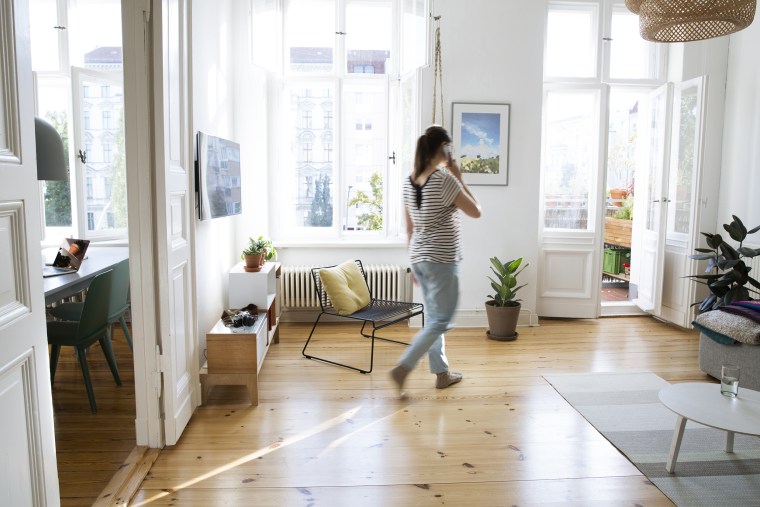Patient concerns about COVID-19 have colored almost every session I've conducted in my practice for the last week, no matter who the client was and no matter what problems had brought them into therapy to begin with.
But one concern kept coming up for my single clients — as well as friends and colleagues who live alone — in particular: the isolation they expected to experience while working from home if (or more likely when) their offices closed for health reasons.
As one friend who lives alone said to me: “Of course I can work from home. But can I stay sane while I’m doing it?”
Studies seems to confirm that closing public settings is an effective means of protecting us physically from COVID-19 — but doing so will also create a different, if less potentially deadly, set of problems for some people. During a time of national stress, contact with others is one of the basic ways that people deal with anxiety, sadness, loneliness, depression, panic and other powerful and potentially difficult emotions, but not all of us live with other people. So social isolation through working from home may be good news in terms of containing the virus, but bad news in terms of easing our anxiety.
For instance, a professional woman told me: “I’ve never wanted to work remotely. I can’t imagine what it would be like to be alone in my apartment all day, doing my work.”
And a man who works in finance said: “I do my best work with people making lots of noise around me; I thrive on the high activity level. Being alone in my apartment is going to make me less productive — and it might just drive me nuts.”
The problems inherent to working from home are not just poised to affect extroverts. Despite the plethora of Twitter and Facebook jokes about this imposed isolation being the stuff that introverts’ dreams are made of, many introverts also need contact with other people — just in different amounts and ways from their extroverted co-workers.
Literature, sociology and psychology are filled with reminders that we all have some (albeit different levels of) need for time with others, whether we define ourselves as shy or outgoing, introverted or extroverted, or a group person or a loner. As Nancy McWilliams, one of the most popular synthesizers of contemporary psychotherapeutic practices, notes, most contemporary models of psychotherapy privilege the significance of relationships in psychological and emotional health.
And research has shown that stress can exacerbate both physical and emotional difficulties, and that one of the ways that we ameliorate the stress is through social contact. Thus, the very activity that will hopefully contain the spread of the COVID-19 virus can be creating its own strain on our bodies and our psyches.
So, though it may take a little ingenuity and extra work, finding healthy human contact while sequestered at home and following CDC guidelines is going to be extremely important during this crisis.
In their book "Connected: The Surprising Power of Our Social Networks and How They Shape Our Lives," scientists Nicholas A. Christakis and James H. Fowler share research about the power of social connections to affect how we feel, think and act. When we’re forced to be away from the important — albeit perhaps unrecognized — social interactions at work, it’s crucial to find other ways to fill the need for connection.
For example, though it's all but gone out of fashion, talking to other people, whether on the telephone or via video conferencing, can both fill in for normal social interactions and break the cycle of focusing on the bad news, while using the same technology that connects you to colleagues and work.
Further, you can use the need for social distancing as an opportunity to reach out to people you have wanted to get to know better, either socially and/or for business. Many people are going to be in the same boat as you, looking for positive ways to connect to people while limiting physical contact; you can look into newly virtual classes, online movie- or television-watching parties or, like the Italians, try to organize or participate in a "Sound Flashmob" of music lovers.
Similarly, research has shown that exercise is effective in lowering stress, in part because it both lowers stress hormones and raises the endorphins or “feel good” chemicals in your body. And, it has also long been a way of connecting. A client, for instance, told me that she was staying away from her yoga studio, but that she desperately missed the few minutes of social contact before and after class. She decided to solve the problem by doing online yoga with a buddy. “We’re at our own homes, but we open up the app and start the class at the same time; and then we talk for a few minutes when it’s over, just like we would do when we were at a class.”
Still, there are people all around us who don’t have the luxury of self-isolating: first responders, health care workers and even people in service industry jobs (many of whom who don’t get paid time off), for example, are also frightened, anxious and stressed. A friendly smile and a question about how they’re doing when you do have to interact with them can go a long way toward ameliorating their discomfort — and, as a nice secondary gain, your own.
As Harvard political scientist Robert D. Putnam describes in his book "Bowling Alone," working in isolation can be something of an oxymoron. Social interactions often optimize our strengths and keep us engaged in work. Connecting with someone who is not a colleague might not feel exactly like you're doing work, but it is a way of enhancing our own — and their — humanity, and keeping our sanity.




